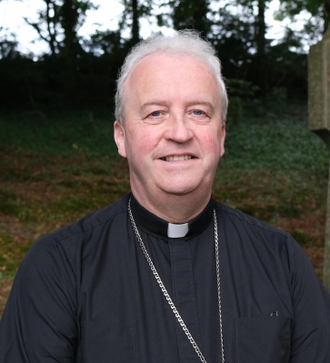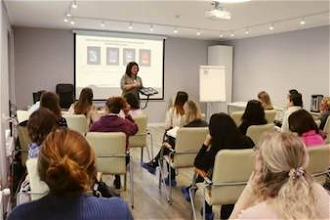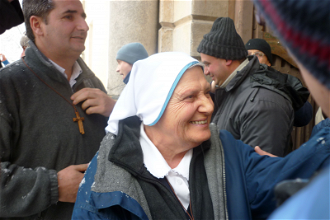Irish Bishop: addiction is not simply a personal problem, it's a national wound

Bishop Michael Router Image: CCO archive
Bishop Michael Router delivered this homily during the closing Mass of the Venerable Matt Talbot Centenary Weekend, in Our Lady of Lourdes Church, Sean McDermott Street, Dublin.
"278,000 family members are directly affected by addiction to drugs in Ireland. Add to that the huge number affected by alcohol abuse and we have an epidemic of silent suffering ... No recovery, no matter how well-funded or medically supported, will be complete without healing of the soul."
The full homily text follows:
On this Feast of Pentecost, we celebrate the outpouring of the Holy Spirit - the birth of the Church - and the empowering of Christ's disciples to go out into the world with courage, truth, and love. On this weekend, we also mark the centenary of the death of a humble Dubliner, Venerable Matt Talbot, whose life speaks directly to both the struggles and the hopes of our society today.
The scripture readings for this feast take us right to the heart of the Christian mystery. In the Acts of the Apostles, we see fearful, uncertain men suddenly transformed by the power of the Holy Spirit. The fire of the Spirit gave them understanding, strength, unity, and a renewed sense of purpose. HIn the Gospel, the risen Christ reminds His disciples that the Holy Spirit will teach them everything and guide them in how to live according to His teaching.
That same Spirit is alive today. He is not distant or confined to history, but is given to you and me, and to every person who longs for healing, for peace, and for meaning. But we must call upon Him, invite Him into our lives, and open our hearts to His transforming grace. Matt Talbot opened his heart to the Spirit's transforming grace, and it changed him in an incredible way.
Matt's early years in Dublin were marked by poverty, hard labour, and addiction. Like so many people he fell into the grip of alcohol at a shockingly young age. It is a pattern that, tragically, we continue to see played out in countless lives across Ireland in 2025.
Addiction in Ireland today is not simply a personal problem - it is a national wound. Our country has, for too long, had a complicated and often toxic relationship with alcohol. Excessive drinking is tolerated and accepted regardless of its damaging and often catastrophic effects. In 2002, a simple school survey I conducted found most senior students drank, many starting as young as 13 or 14 years-old, a fact that did not shock or surprise anyone even then.
We now face the increased threat of drugs. Cocaine, cannabis, and other substances are widely available and deeply destructive. What once was a problem in cities and large towns is now an issue in rural areas as well. The figures are alarming. It is known that as many as 278,000 family members are directly affected by addiction to drugs in Ireland. Add to that the huge number of family members affected by alcohol abuse and we have an epidemic of silent suffering. Behind these statistics are parents lying awake at night wondering if their son or daughter will come home. There are children living in fear, families carrying crushing debts intimidated by drug gangs or hiding in shame, suffocated by silence. The psychological and emotional toll of anxiety, depression, isolation, and hopelessness is profound.
A very important part of healing and recovery for our society is the recognition by all, that addiction is a healthcare issue, not simply a moral failing or criminal matter. We need better-funded supports, earlier intervention, trauma-informed care, and above all, we need compassion. Organisations like the Rise Foundation, Merchants Quay Ireland, the Family Addiction Support Network (FASN) and Families in Addiction Recovery Ireland (FARI) are doing tremendous work, that is often under-resourced, walking with families in their pain and helping them rediscover their strength and confidence.
There is another very important truth, however, one that is often overlooked in the modern response to addiction, that the spiritual dimension of the human person cannot be ignored. No recovery, no matter how well-funded or medically supported, will be complete without healing of the soul. This is something that the life and example of Matt Talbot teaches us.
At the age of 28, at his lowest and most desperate moment, Matt made a choice. He walked away from alcohol and into the embrace of God. But it wasn't easy. He didn't rely on willpower alone. He turned to the sacraments, to prayer, to daily Mass, to scripture and to penance. He gave himself completely to the grace of the Holy Spirit. That grace didn't just keep him sober; it saved him and made him a hero of temperance and self-control - two virtues that are so badly needed in today's world.
This is where we, the Church, must speak confidently. The Holy Spirit poured out at Pentecost was not just for the apostles. He is for the alcoholic on the street, the teenager tempted by drugs, the parent on the brink of despair. He is the only true power that can completely break the chains of addiction. The Holy Spirit is present in the Church - in the Eucharist, in Confession, in the community, and in the quiet support of believers walking alongside one another helping each other along the way.
To the families struggling with the weight of addiction we, who follow Christ, want you to be aware that you are not alone, you are not forgotten, and you are not to blame. To those trying to start the journey to healing and recovery know that you are loved. Know that Jesus has never turned His back on you and recognise that, like Matt Talbot, your story is not finished - it may, in fact, be just beginning.
To those who operate the levers of power in our society I say that funding matters, resources and personnel matter, policy and long-term planning matter, but the soul and faith of the person matter too.
The soul of a person is important for true physical and psychological healing, but it cannot be treated with medicine alone. The culture of consumption and materialism we have created must be balanced with a culture of spiritual renewal. If not, then pain and loneliness will be crippling elements of modern life. The Holy Spirit has not lost his power or gone silent. He is waiting to be called upon - in our lives, in our homes, and in our nation.
As we honour Matt Talbot on this the weekend of the centenary of his death, let us also pray for his beatification and progress along the road towards sainthood. We pray for his intercession for all who struggle with addiction, and for the families who carry such invisible pain. Let us commit ourselves to supporting them, not just with words, but with action - with listening, with our resources, and with our prayers.
Above all, let us cry out with faith and confidence, today and every day:
'Come, Holy Spirit.
Fill the hearts of your faithful.
And kindle in us the fire of your love.
Send forth your Spirit and they shall be created,
And You shall renew the face of the earth.
Amen.'
Bishop Michael Router is Auxiliary Bishop of the Archdiocese of Armagh, chair of the Bishops' Council for Healthcare and serves as liaison bishop to the Irish Bishops' Drugs Initiative.


















